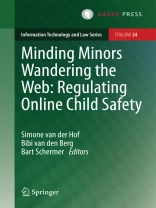Ensuring online safety has become a topic on the regulatory agenda in many Western societies. However, regulating for online safety is far from easy, due to the wide variety of national and international, private and public actors and stakeholders that are involved. When regulating online risks for children it is important to strike the right balance between protection against harms on the one hand and safeguarding their fundamental freedoms and rights on the other. The authors in this book attempt to grapple with precisely this theme: striking the right balance between ensuring safety for children on the internet while at the same time enabling them to experiment, to learn, to enrich their lives, to acquire skills and to have fun using this global network. The authors come from various scientific disciplines, ranging from law to social science and from media studies to philosophy. This means that the book provides the reader with both empirical and theoretical/conceptual chapters and sheds a multi-disciplinary light on the complex topic of regulating online safety for children.
Table of Content
Regulating online child safety: Introduction.- Children’s rights online: Challenges, dilemmas and emerging directions.- A framework for responding to online safety risks.- Colouring inside the lines: Using technology to regulate children’s behaviour online.- Safety by literacy? Rethinking the role of digital skills in improving online safety.- Taking risks on the World Wide Web: The impact of families and societies on adolescents’ risky online behavior.- No child’s play: Online data protection for children.- The right to privacy for children on the internet: New developments in the case law of the European Court of Human Rights.- Online social networks and young people’s privacy protection: The role of the right to be forgotten.- Follow the children! Advergames and the enactment of children’s consumer identity.- Children and peer-to-peer risks in social networks: Regulating, empowering or a little bit of both? On technology against cyberbullying.- Violent video games and cyberbullying: Why education is better than regulation.- Addressing cyberbullying using a multi-stakeholder approach: The Flemish case.- Regulating online sexual solicitation: Towards evidence-based policy and regulation.- Protecting children from the risk of harm? A critical review of the law’s response(s) to online child sexual grooming in England and Wales.
About the author
Simone van der Hof is Full Professor of Law and Information Society at the Center for Law and the Information Society at Leiden University, the Netherlands. Bibi van den Berg is Assistant Professor at the Center for Law in the Information Society of Leiden University. Bart Schermer is Assistant Professor at the Center for Law in the Information Society of Leiden University.












